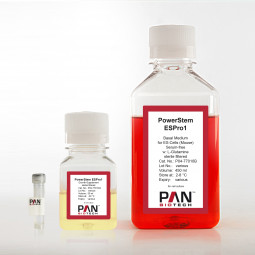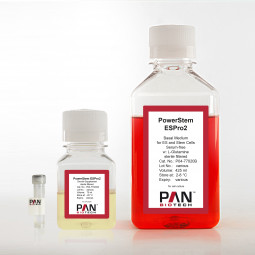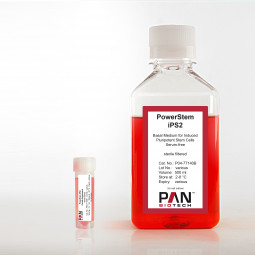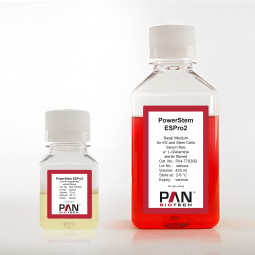Description
PowerStem ESPro1 is an easy to use serum-free medium for cultivation of embryonic stem cells of mice (mES cells). These pluripotent cells are derived from blastocysts and they can be established to a permanent cell culture. After injection into blastocysts in chimeras, they can form all tissues, including germ cells. In PowerStem ESPro1, the mES cells largely maintain their undifferentiated state and can be integrated into the germ line.
PowerStem ESPro1 basal medium, PowerStem ESPro1 growth supplement and PowerStem ESPro1 LIF supplement are guaranteed stable for 12 months when properly stored. PowerStem ESPro1 complete medium (basal + supplements) is stable for 1 month when stored in the dark at 2-8° C. We do not recommend using the complete medium beyond 1 month.
Composition
PowerStem ESPro1 contains purified proteins, lipids, salts, amino acids, trace elements, attachment factors, hormones and growth factors in an optimized formulation. PowerStem ESPro1 is fully chemically defined and contains no peptones or hydrolysates.
Please note: Supplemented PowerStem ESPro1 contains LIF in a concentration of 10 μg/l. If higher levels of LIF are required for your experimental setting, please add additional LIF to the medium.
Suitability
Special advantages
PowerStem ESPro1 allows the cultivation and expansion of mouse embryonic stem cells (mES cells) under serumfree conditions. It is fully defined in its composition and thus enables constant and comparable experimental conditions resulting in highly reproducible data. The mES cell culture can be established without the usual feeder layer (primary fibroblasts). Cells show a high proliferation rate and largely retain an undifferentiated state. By adding specific differentiation factors, mES cells can differentiate in vitro to the desired cell types (e.g. nerve cells, muscle cells, endothelial cells, etc.). Following injection into blastocysts, they can form all tissues in chimeras. Therefore it is possible to generate animals whose genome has been manipulated previously in a cell culture (e.g. knock-out / knock-in mice).
Please note: For differentiation studies LIF supplement must be omitted.






